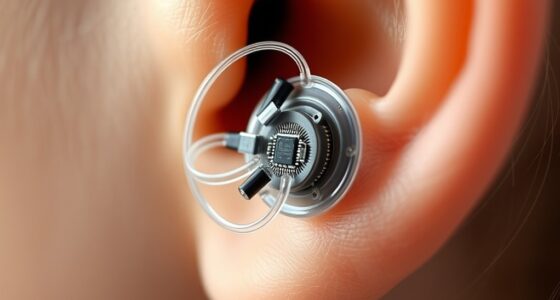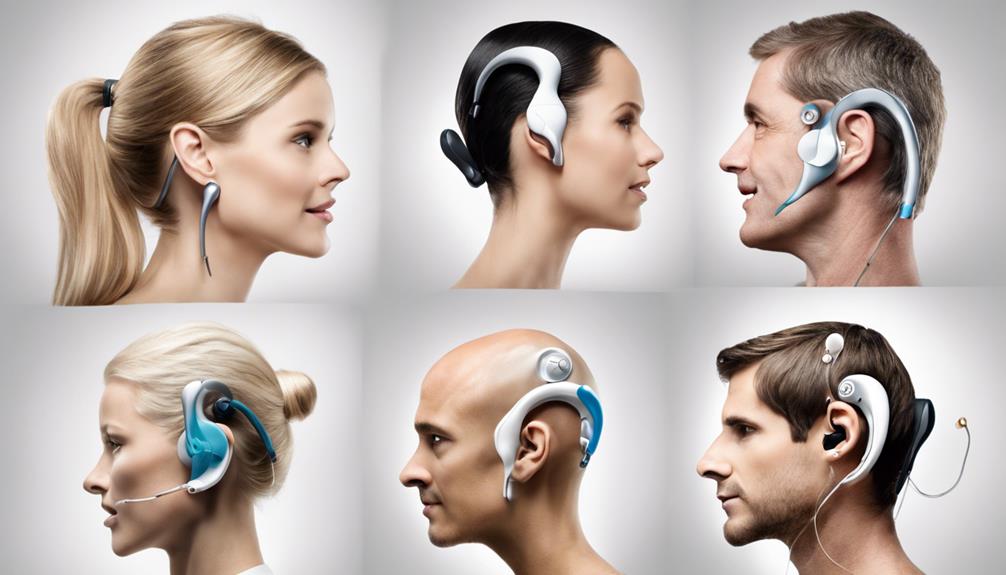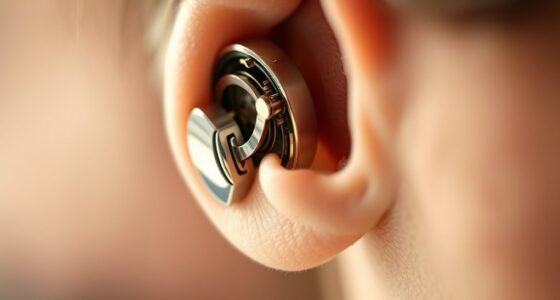Investigating Medicare’s guidelines for cochlear implants in cases of unilateral hearing loss is intriguing because of its intricate nature. Understanding the qualifications and extent of coverage can sometimes feel like navigating a maze of information.
Let's shed some light on how Medicare approaches the coverage of cochlear implants for single-sided deafness and what it means for those in need of this specialized care.
Key Takeaways
- Medicare covers cochlear implants for single-sided deafness based on medical necessity.
- Coverage may vary under Medicaid with state-specific eligibility criteria.
- Consult healthcare providers to understand Medicare and Medicaid coverage options.
- Clarity on eligibility and coverage details is essential for decision-making.
Medicare Coverage for Cochlear Implants
Medicare covers cochlear implants for individuals with bilateral moderate-to-profound sensorineural hearing impairment who demonstrate limited benefit from using bilateral hearing aids. This coverage by Medicare is crucial for beneficiaries who struggle with hearing loss and haven't found sufficient help through traditional hearing aids.
The Centers for Medicare & Medicaid Services (CMS) require beneficiaries to show limited benefit from hearing aids to be eligible for cochlear implant coverage, emphasizing the importance of auditory clues and sound perception in daily life. Moreover, Medicare's coverage extends to ensuring that beneficiaries comply with FDA-approved labeling and criteria related to ear health and device usage.
Eligibility Criteria for Medicare Coverage

When considering eligibility for Medicare coverage of cochlear implants, specific criteria must be met to ensure individuals meet the necessary requirements for the procedure. To be eligible for Medicare coverage of cochlear implants for single-sided deafness, beneficiaries need to meet the following criteria:
- Diagnosis of Single-Sided Deafness and Limited Benefit: Individuals must have a documented diagnosis of single-sided deafness and show limited benefit from traditional hearing aids.
- Cognitive Ability and Rehabilitation: Beneficiaries should demonstrate the cognitive ability to interpret auditory clues and be willing to undergo rehabilitation to adjust to the cochlear implant.
- Health Requirements and FDA-Approved Devices: Specific health requirements need to be met to ensure suitability for implantation. Additionally, beneficiaries must comply with the usage of FDA-approved cochlear implant devices to qualify for Medicare coverage.
Meeting all outlined eligibility criteria is crucial for individuals seeking Medicare coverage for cochlear implants for single-sided deafness. It ensures that the procedure is beneficial and appropriate for the individual's specific condition and needs.
Out-of-Pocket Costs and Medicare Coverage
Exploring the financial aspects of cochlear implant coverage, beneficiaries should be aware of the out-of-pocket costs associated with Medicare-approved expenses for single-sided deafness. Medicare typically covers 80% of the Medicare-approved costs for cochlear implants, leaving beneficiaries responsible for the remaining 20% as out-of-pocket expenses.
To alleviate this financial burden, individuals can opt for supplemental insurance plans, which may help cover some or all of the out-of-pocket costs related to cochlear implants. Moreover, Medicare Advantage plans offer additional coverage options that can assist in managing costs associated with cochlear implants for single-sided deafness.
Understanding the specific insurance coverage details of your plan is crucial in navigating the out-of-pocket expenses linked to cochlear implants. By being informed about the available coverage options and potential costs, beneficiaries can make well-informed decisions regarding their cochlear implant treatment while effectively managing their financial responsibilities.
Medicare Coverage for Bone-Anchored Hearing Aids

Covered under Part B, bone-anchored hearing aids are a treatment option for individuals with single-sided deafness. These devices work by transmitting sound vibrations through the skull bone, bypassing the outer and middle ear. When considering Medicare coverage for bone-anchored hearing aids, it's important to note that coverage criteria may vary depending on specific insurance plans.
- Coverage Variation: Medicare covers bone-anchored hearing aids under Part B; however, the specific coverage criteria may differ among various insurance plans. It's advisable to check with your insurance provider to understand the coverage details for these devices.
- Surgical and Non-Surgical Options: Bone-anchored hearing aids can be both surgical and non-surgical options for treating single-sided deafness. The choice between these options may depend on individual preferences and medical recommendations.
- Medicare Advantage Plans: In addition to traditional Medicare coverage, Medicare Advantage plans also offer coverage for bone-anchored hearing aids. These plans may have specific guidelines regarding coverage and eligibility, so it's essential to review the plan details carefully.
Medicare and Medicaid Coverage Comparison
Medicare and Medicaid offer differing coverage options for various medical treatments, including cochlear implants. When it comes to cochlear implants for single-sided deafness, Medicare typically covers them under specific criteria deemed medically necessary. On the other hand, Medicaid coverage for cochlear implants may vary by state, with different eligibility requirements and coverage options compared to Medicare.
Individuals with single-sided deafness seeking cochlear implants should consult with healthcare providers to determine the coverage options available to them under both Medicare and Medicaid. While Medicare generally covers cochlear implants for single-sided deafness based on medical necessity, Medicaid may have variations in coverage based on state-specific regulations and guidelines. Understanding the eligibility criteria and coverage options under both Medicare and Medicaid is crucial for individuals with single-sided deafness considering cochlear implants to make informed decisions regarding their healthcare needs.
Frequently Asked Questions
Are Cochlear Implants Approved for Single Sided Deafness?
Yes, cochlear implants are typically not approved for single-sided deafness under Medicare. The coverage criteria mainly target bilateral, moderate-to-profound sensorineural hearing loss. Single-sided deafness may not meet the specific eligibility requirements for cochlear implants.
Medicare coverage expansion primarily benefits individuals with bilateral hearing impairment. For alternative options for single-sided deafness, consulting healthcare providers is recommended.
Does Medicare Cover Cochlear Implants 2023?
In 2023, Medicare expanded coverage criteria for cochlear implants, offering more individuals with hearing loss the chance to qualify.
The updated guidelines emphasize specific requirements like bilateral moderate-to-profound hearing impairment, cognitive ability, limited benefit from hearing aids, and adherence to FDA-approved usage guidelines.
This change allows beneficiaries scoring between >40% to ≤60% to access this beneficial technology promptly, aiming to enhance sound awareness, speech understanding, and overall quality of life.
How Do You Qualify for a Cochlear Implant?
We can qualify for a cochlear implant if we have bilateral moderate-to-profound sensorineural hearing impairment and show limited benefit from hearing aids. Our cognitive ability to interpret auditory clues and willingness for rehabilitation are crucial.
Meeting FDA guidelines, lacking surgery contraindications, and fulfilling Medicare criteria can enhance our communication and quality of life. Cochlear implants offer hope and improved hearing for those who meet the eligibility requirements.
What Are the CMS Criteria for Cochlear Implants?
We meet CMS criteria for cochlear implants by having bilateral moderate-to-profound hearing loss and limited benefit from hearing aids. Factors like cognitive ability, willingness for rehabilitation, suitable cochlea, and no auditory nerve issues matter.
Compliance with FDA labeling is vital for coverage.
Conclusion
In conclusion, Medicare's coverage for cochlear implants for single-sided deafness is like a ray of hope shining through the clouds for those in need.
With expanded eligibility criteria and reduced out-of-pocket costs, more individuals can now access life-changing auditory technology.
This coverage opens doors to a world of sound and communication, providing a bridge to a brighter future for those with hearing impairments.










